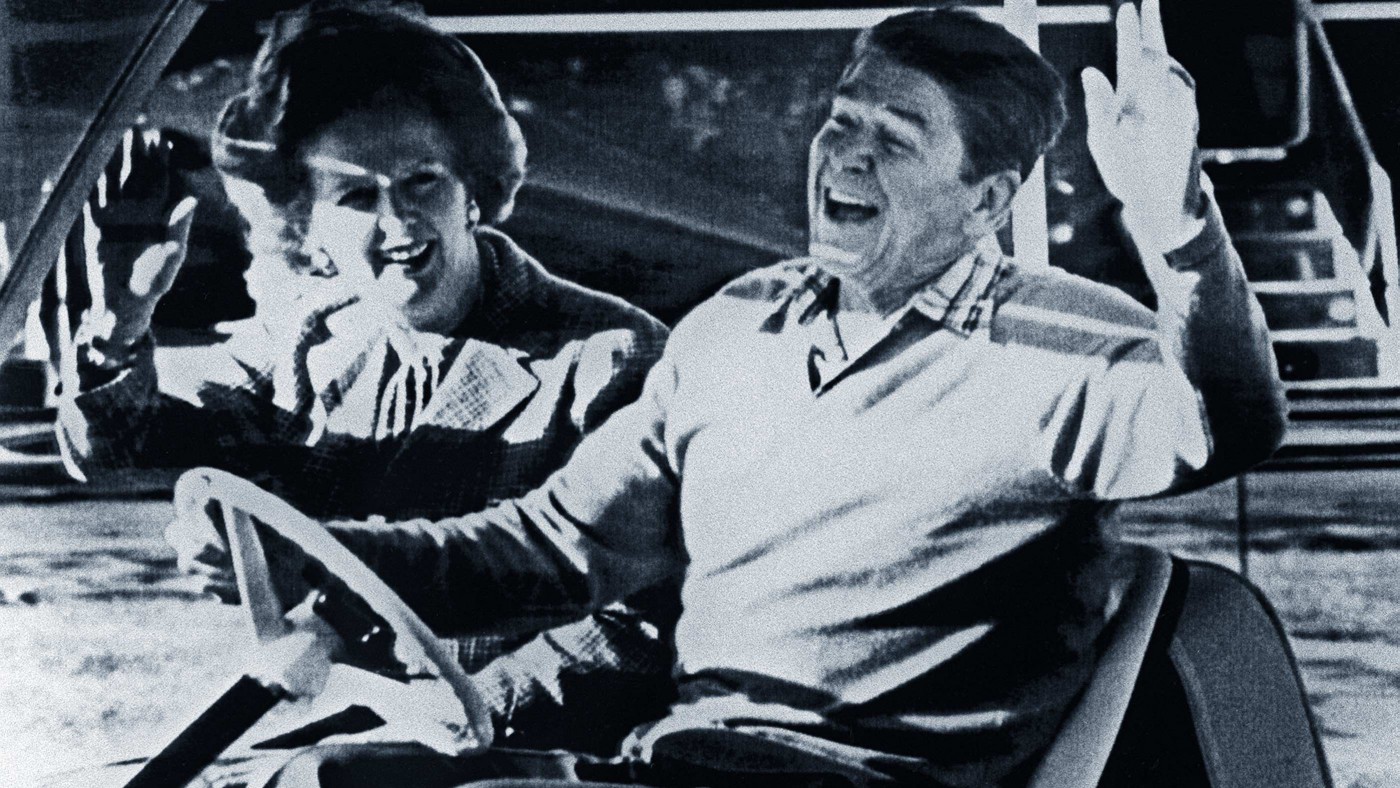The Reagan/Thatcher revolution was much the most important event in peacetime Twentieth Century history. Though neither leader had read Spengler, both set out to refute him. He proclaimed the decline of the West. They pronounced an anathema on decline and set about persuading their peoples that the best was yet to be.
It is important to remember just how bad everything was in the darkest hour before their rescue mission began. America had lost a war, and a President. Although Richard Nixon had a title to greatness, his personality was founded on flaws. It would require Shakespeare to do justice to his tragedy. After Vietnam and Watergate, liberal extremists did everything possible to bring aid and comfort to America’s foes, abetted by a weakling President. Jimmy Carter might have enjoyed life as an Old Testament prophet, but he lacked the presence and the eloquence. A little man, he seemed to delight in belittling his country.
At home, America was beset by pessimism. The purveyors of gloom insisted that energy was running out, while the economy was doomed to stagnation: living standards, to decline. Books were written on the greying of America, as if the closure of the American frontier would be followed a few decades later by the closure of the American dream. Abroad, America was beset by weakness. Soviet surrogates were making gains in Central America and Southern Africa. Europe was full of uncertainty. The Cold War was not going well for the West.
In the UK, it was far worse. The two most recent Conservative administrations had ended in failure and defeat. The two most recent governments had been defeated by the trade unions, which were virtually outside the rule of law and often run by Soviet sympathisers. Inflation was chronic, exchange controls made it hard to take more than fifty pounds out of the country, while nationalised industries plundered the taxpayer to fund obsolescence and low productivity.
It was widely believed that British economic decline was irreversible. In Whitehall, there was a lot of covert talk about the orderly management of decline – as if that were the highest aspiration open to any government. Until early 1979, it did not seem impossible that Margaret Thatcher would lose to Jim Callaghan, who would have governed in a concordat with the trade unions: the avuncular personification of orderly decline. A lot of bright youngsters were in despair.
Then dawn broke. It was easier in America. Guided by his limitless faith in his own people – when he wanted to find out what they were thinking, he just had to look into his own heart – President Reagan knew what was needed. He reasserted those two crucial unwritten passages in the Bill of Rights. First, that this year shall be better than last year, and that next year shall be better than this year. Second, that each and every American shall have the right to work his butt off and keep a goodly proportion of the proceeds. As for government, when it came to the economy it was best employed cheering on America from the sidelines.
A thoughtful man with a great deal of self-confidence and moral depth, Reagan did not need intellectuals to tell him what was right. He knew what was right.
It is a paradox, therefore, that the Reagan revolution was accompanied by the most significant intellectual development in the history of American conservatism: the fusion of the neo-Cons and the Republican party.
Initially, there was some mutual suspicion. Manhattan Jewish intellectuals and Southern Baptists do not naturally sit in the same congregation. Not many years earlier, the great Midge Decter had said that she could never vote Republican; their grandfathers had tried to stop her grandfathers from coming in. Early on, I said to Midge: “Aren’t you the Jewish wing of the moral majority.” There was a pause. “Yes. I guess we are.” More recently, there have been obvious problems, but the Iraq War does not mean that neo-Conservatism is about to disappear from history.
Britain was different, as was Margaret Thatcher. She did not possess the same serene assurance as Ronald Reagan. Intellectuals played a vital role in boosting her intellectual and political self-confidence. The Left tried to dismiss her as a shrill housewife. She found the courage to fight back partly because her advisors assured her that far from being housewife economics, her ideas were at the new forefront of economic theory, along with Friedman, Hayek and von Mises.
The first Tory Leader ever to use the term “intellectual” with unqualified approval, she was not one. She had no interest in sophisticated academic scepticism. She wanted her ideas – and her intellectuals – advancing towards the sound of gunfire. There was a Salvation Army quality in her approach to debate: “Onward Thatcher soldiers, marching as to war.” But that helped her to win the war. By the early Eighties, she was not just an embattled politician. She was an idee en march.
There is a delicious irony. The term “Thatcherism” was first coined in Marxism Today. Its authors recognised an ideology when they saw one charging towards them. It was their final contribution to debate, as they realised that there was going to be no Marxism tomorrow.
I once put it to Margaret Thatcher that there was a curious element to her relationship with President Reagan. It would have been hard to imagine his serving in her government, in any capacity. He was not good enough at detail. “Ron may not understand detail,” she replied: “but he understands the principles necessary for the restoration of American greatness.” So he did. For her, the devil was in the detail. For him, God was in the big picture. Both approaches worked, for which we can all be grateful. There are plenty of problems in the world: “The troubles of our proud and angry dust/ are from eternity, and shall not fail.” But think how much worse it would be, without their revolution.


